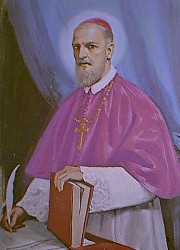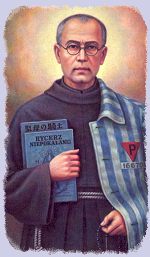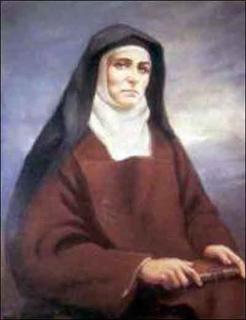
March 19
SAINT JOSEPH was descended from the kingly line of David, and was a kinsman of the Blessed Virgin Mary. (Matthew 1:1-16) The Gospel gives him the praise of being just (Matthew 1:19), that is, a man distinguished for all virtues. And surely, as he was chosen from all other men by God to be the foster-father of His Son, he undoubtedly excelled, in virtues and sanctity, all saints then living. Of his youth nothing certain is known to us, and of his later life we know only what the Gospel relates. He was a carpenter (Matthew 13:55), and lived at Nazareth, in Galilee (Luke 2:4). Being espoused to Mary, he was inclined, upon learning that she was with child, to put her away privately, not wishing to expose her to public reproach; but being instructed by an angel, he took her to himself, in obedience to the command of God, went with her to Bethlehem, and afterwards, with Mary and the new-born child, fled, without timidity, to Egypt. (Matthew 2:13) At the command of the angel he returned thence, and again dwelt in Nazareth (Matthew 2:23). From this place they went every year to the feast at Jerusalem, where it happened that Jesus, then twelve years old, remained behind them in the temple, and was anxiously sought for by them. More than this is not told us. At the time of the marriage at Cana it would seem that he was no longer living, since there is no mention made of him. Though little is said of him, that little is rich in profitable instruction. How worthy to be admired and imitated is his example, his chastity, his tenderness towards Mary, his forbearing to pronounce a judgment in regard to her condition when he could not explain it, his quick and unreserved obedience towards God and the commands of authority, his love for Jesus, and his care for both the mother and the child. On account of his sanctity God has specially distinguished him by miracles, and the Church honors him in a particular manner. In the Litany of the Saints he is named among the patriarchs, and the feast of his patronage is celebrated on the third Sunday after Easter. Venerate, therefore, Saint Joseph; choose him for your protector in life and in death, and make yourself worthy of his protection by following his example.
The Introit of the Mass is as follows:
"The just shall flourish like the palm-tree; he shall grow up like the cedar of Libanus, planted in the house of the Lord, in the courts of the house of our God. It is good to give praise to the Lord, and to sing to Thy name, O Most High."
Glory be to the Father, and to the Son, and to the Holy Spirit. As it was in the beginning, is now, and ever shall be, world without end. Amen.
The Introit of the Mass is as follows:
"The just shall flourish like the palm-tree; he shall grow up like the cedar of Libanus, planted in the house of the Lord, in the courts of the house of our God. It is good to give praise to the Lord, and to sing to Thy name, O Most High."
Glory be to the Father, and to the Son, and to the Holy Spirit. As it was in the beginning, is now, and ever shall be, world without end. Amen.
Prayer
We beseech Thee, O Lord, that we may be assisted by the merits of the spouse of Thy most holy Mother, that what of ourselves we are unable to obtain may be given to us by his intercession. Who livest and reignest with You and the Holy Spirit, for ever and ever, Amen.
Epistle: Ecclesiasticus 45:1-6
He was beloved of God and men: whose memory is in benediction. He made him 1ike the saints in glory, and magnified him in the fear of his enemies, and with his words he made prodigies to cease. He glorified him in the sight of kings, and gave him commandments in the sight of his people, and showed him His glory. He sanctified him in his faith and meekness, and chose him out of all flesh. For He heard him, and his voice, and brought him into a cloud. And He gave him commandments before his face, and a law of life and instruction.
Gospel: Matthew 1:18-21
When Mary, the Mother of Jesus, was espoused to Joseph, before they came together, she was found with child, of the Holy Ghost. Whereupon Joseph her husband, being a just man, and not willing publicly to expose her, was minded to put per away privately. But while he thought on these things, behold the angel of the Lord appeared to him in his sleep, saying: Joseph, son of David, fear not to take unto thee Mary thy wife, for that which is conceived in her is of the Holy Ghost; and she shall bring forth a Son, and thou shalt call His name JESUS: for He shall save His people from their sins.
Instruction
To encourage us to veneration for Saint Joseph, Saint Teresa wrote:
"I do not remember to have asked Saint Joseph for anything which he did not grant me. The great favors which God has granted me through him, and the many dangers of soul and body from which he has freed me, truly deserve admiration. It seems that God has granted to other saints the grace of assisting, in particular needs, those who invoke their intercession; but this glorious saint assists in all needs. The Lord seems thereby to indicate that, as He was subject to Joseph on earth, so now He grants him whatever he asks for. The same thing has been experienced by persons whom I have advised to recommend themselves to him."
---------------------------------------------------------------
"I would gladly advise everyone," says Saint Alphonsus, "to have a great devotion towards this saint, since I have experienced what graces he can obtain from God. For several years I have asked him, on his feast, for some par ticular grace, and every time my petition has been granted. As we all have to die, we should have a particular devotion towards Saint Joseph, that he may obtain for us a happy death; for all Catholic Christians consider him to be an intercessor for the dying, and that he assists, at the hour of death, those who venerate him; and this for three reasons:
1. Because Jesus loves him, not only as a friend, but as a father, on which account his intercession is more powerful than that of any other saint.
2. Because Saint Joseph obtained special power against the evil spirits who tempt us at the hour of death.
3. The assistance which Jesus and Mary gave to Joseph at the hour of his own death procured for him the right to obtain a holy and easy death for his dependants. If in their dying hour they invoke his aid, not only will he assist them, but he will obtain for them the assistance of Jesus and Mary."
Ought not these words of a great saint encourage you to venerate Saint Joseph every day? Should not the hope of dying one day under the protection of Jesus, Mary, and Joseph, move you to devotion to the foster-father of Jesus?
Prayer to Saint Joseph
O most chaste Joseph, who, by thy purity and other exalted virtues, wast worthy to be chosen for the spouse of Mary and the foster-father of Jesus, I beseech thee, by the great graces of which thou wast made partaker, that thou wouldst, by thy intercession, obtain for all parents grace to rear their children piously; for all married persons who are distressed and afflicted through poverty and tribulations consolation and encouragement; for all unmarried persons who have devoted tbeir chastity to God the grace of perseverance; and, finally, for all the dyjng the grace to come, after a happy death, to thy foster- child, Jesus Christ, Who, with the Father and the Holy Ghost, liveth and reigneth one God, world without end. Amen.
-- Goffine's Devout Instructions










